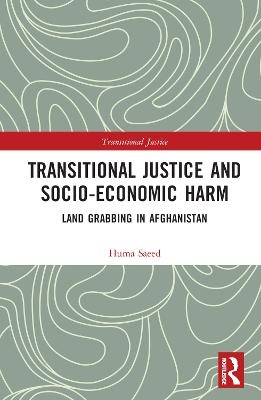
Transitional Justice and Socio-Economic Harm
Routledge (Verlag)
978-0-367-68134-0 (ISBN)
On 3 September 2003, 100 armed police officers bulldozed around 30 homes in the Sherpur neighborhood of Kabul, Afghanistan, evicting over 250 people. Historically, the land was part of the property of the Ministry of Defense, of which a zone was allocated to the ministry’s employees who had built homes and had lived there for nearly 30 years. After the demolition, however, the land was distributed among 300 high-ranking government officials, including ministers, deputy ministers, governors and other powerful warlords. Land grabbing in Afghanistan has become a widespread practice across the country. Based on over 50 semi-structured interviews with key informants and group discussions with war victims and local experts in Kabul, the current book examines the relevance of transitional justice discourse and practice in response to this situation. Following a critical criminological concern with social harm, the book maintains that it is not enough to consider a country’s political history of violent conflict and the violation of civil and political rights alone. Rather, to decide on appropriate transitional justice mechanisms, it is crucial to consider a country’s socio-economic background, and above all the socio-economic harm inflicted on people during periods of violent conflict.
This original and detailed account of the socio-economic challenges faced by transitional justice mechanisms will be of interest to those studying and working in this area in law, politics, development studies and criminology.
Huma Saeed is an affiliated senior researcher at the Leuven Institute of Criminology, Belgium, and an independent consultant on transitional justice and human rights.
Preface and acknowledgments
Introduction: Setting the scene
A land-grabbing case in the Sherpur neighborhood of Kabul
Relevance of Sherpur for the current study
Sherpur and beyond
Research aim
Introduction to the conceptual framework
Critical criminology
Transitional justice
Introduction to the empirical component
Methodology
Desk research
Fieldwork
Data analysis
Ethical considerations
Research limitations and challenges
Security
Data saturation
Validity and reliability
Researcher’s positionality
Emotional challenges of the data analysis
Book structure
References
1 Socio-economic harm in violent conflicts, transitional justice and critical criminology
Socio-economic harm in times of violent conflicts
Socio-economic harm, transitional justice and criminology
Transitional justice and socio-economic harm
Transitional justice and development
Transitional justice and structural inequality: A move towards transformative justice
Critical criminology and a harm-based approach to crime
Critical criminology
An understanding of crime
Harm-based approach to crime
State crime
Approaches to state crime
State crimes as serious human rights violations
Approaches to economic crime in criminology
Conclusion
References
2 Housing, Land and Property (HLP) loss in violent conflict
The right to adequate housing in the human rights regime
HLP rights violation in violent conflicts and peace settlements
Land grabbing and transitional justice
Land dispute, urbanization and criminology
Conclusion
References
3 Violent conflict, socio-economic harm and transitional justice in Afghanistan
Conflict background
The Bonn Agreement
Transitional justice in Afghanistan
“A Call for Justice”
The Action Plan for Peace, Reconciliation and Justice
Bottom-up approach to transitional justice
The impact of violent conflict on the socio-economic fabric of the Afghan society
Market economy and liberal peacebuilding in Afghanistan
Conclusion
References
4 Housing, Land and Property rights in Afghanistan
Background and legal framework for HLP rights in Afghanistan
HLP rights, women and the marginalized population
Land titling and registration
Land dispute mechanisms in Afghanistan
Conflict impact on HLP rights in Afghanistan
The returnee IDPs’ perception on HLP harm
The returnees’ perception on HLP harm
Perceptions of victims of land grabbing
Conclusion
References
5 Land grabbing in Afghanistan
General background and definition of land grabbing in Afghanistan
Definition of land grabbing in Afghanistan
Land grabbing in the Afghan law
Tackling land grabbing in practice
The Strategic Plan to combat land grabbing
Other measures by the government to tackle land grabbing
Conclusion
References
6 Land grabbing in Afghanistan, economic-state crime and transitional justice
Land grabbing as economic crime
The actor
The motive behind the act
The contextual factors and means employed
The consequences and harm
Land grabbing as state crime
State crimes of commission
State crimes of negligence
State crime by omission
Land grabbing as economic-state crime
Transitional justice and land grabbing
Land grabbing and impunity
Land grabbing and property restitution/provision to the IDPs and returnees
Land grabbing as serious human rights violations
Quality (the degree of gravity)
Quantity (level of frequency)
Conclusion
References
7 Transitional justice and criminology: Bridging the gap
Through the prism of crime
The gap between criminology and transitional justice
Towards bridging the gap by combining fieldwork and an interdisciplinary approach
Crime as injury and social harm
State crime victims
Through the methodological prism
Conclusion
References
Conclusion
Main argument and research contribution
Recommendations
Recommendations for future research
References
Appendix A: Questionnaire
Appendix B: List of interviews
Index
| Erscheinungsdatum | 01.09.2022 |
|---|---|
| Reihe/Serie | Transitional Justice |
| Zusatzinfo | 3 Tables, black and white |
| Verlagsort | London |
| Sprache | englisch |
| Maße | 156 x 234 mm |
| Gewicht | 453 g |
| Themenwelt | Recht / Steuern ► EU / Internationales Recht |
| Recht / Steuern ► Strafrecht ► Kriminologie | |
| Recht / Steuern ► Strafrecht ► Strafverfahrensrecht | |
| Sozialwissenschaften ► Politik / Verwaltung | |
| Sozialwissenschaften ► Soziologie ► Spezielle Soziologien | |
| ISBN-10 | 0-367-68134-X / 036768134X |
| ISBN-13 | 978-0-367-68134-0 / 9780367681340 |
| Zustand | Neuware |
| Informationen gemäß Produktsicherheitsverordnung (GPSR) | |
| Haben Sie eine Frage zum Produkt? |
aus dem Bereich


